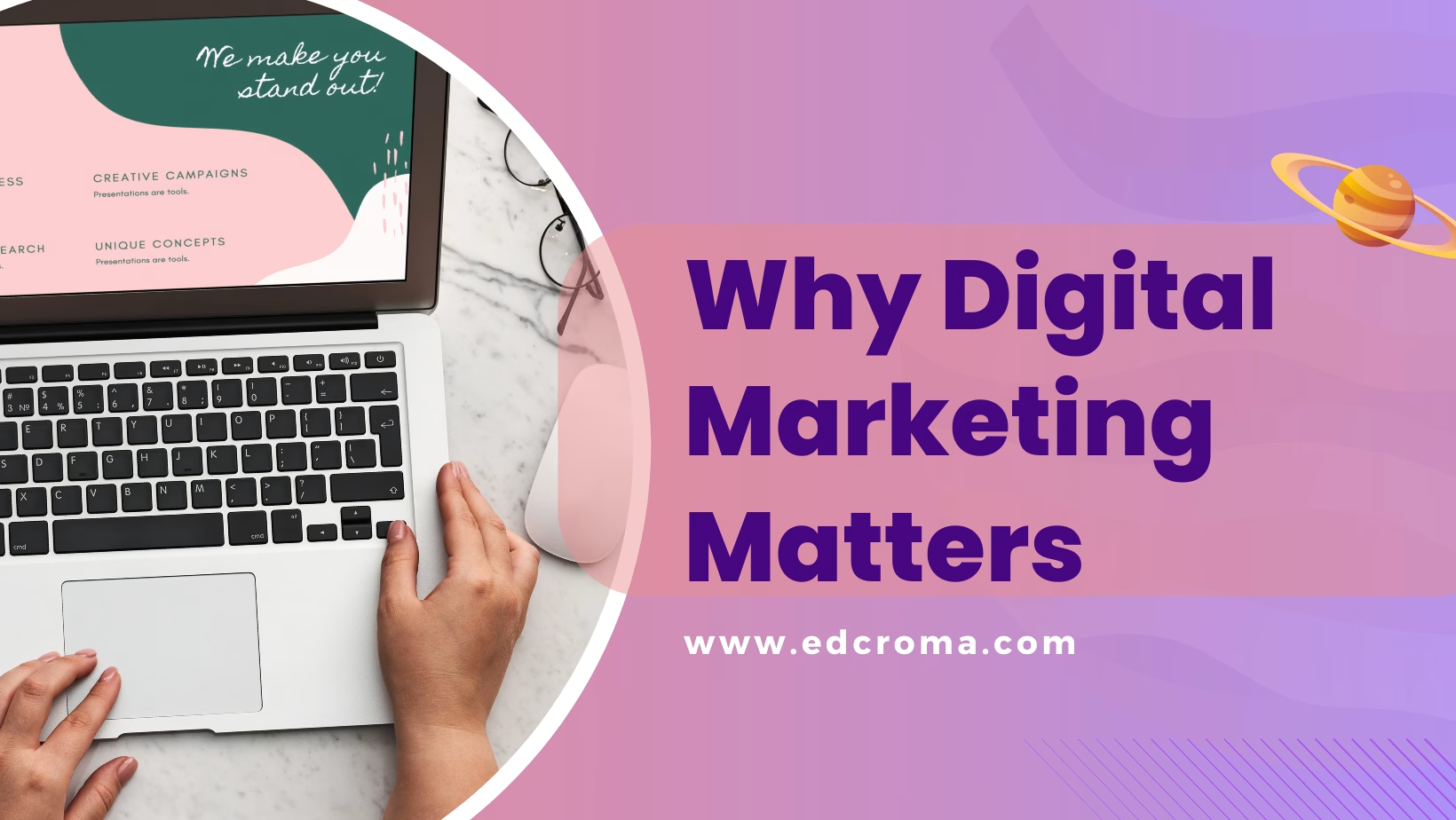Why Digital Marketing Matters: Definition, Benefits, and Strategies

Marketing in today’s world is all about meeting customers where they are—online. Digital marketing is a modern approach to promoting products, services, or brands using internet-based tools and platforms. From small startups to global corporations, every business relies on digital strategies to expand reach, increase sales, and build long-term customer relationships. In this blog, we will explore the definition, types, benefits, and strategies of digital marketing, along with its importance in shaping the future of businesses.
What is Digital Marketing?
Digital marketing refers to the use of online platforms, technologies, and strategies to promote products, services, or brands to a target audience. Unlike traditional marketing methods, which rely on mediums such as print, radio, and TV, digital marketing leverages the internet and digital channels to reach potential customers where they spend most of their time—online.
A simple definition of digital marketing is:
“Digital marketing is the practice of promoting products or services using digital platforms and tools to engage and convert audiences.”
Whether it’s a small local business or a global corporation, digital marketing is vital for building brand awareness, driving traffic, and increasing sales in today’s interconnected world.
Types of Digital Marketing
Digital marketing encompasses a wide range of strategies and tactics. Here are the most prominent types:
1. Search Engine Optimization (SEO)
SEO involves optimizing your website to rank higher on search engine result pages (SERPs). By using keywords, improving site structure, and creating high-quality content, businesses can attract organic traffic.
2. Pay-Per-Click Advertising (PPC)
PPC advertising allows businesses to display ads on search engines or social media platforms and pay only when users click on them. Google Ads is a popular example.
3. Social Media Marketing (SMM)
This involves using platforms like Facebook, Instagram, Twitter, LinkedIn, and TikTok to engage with audiences, build brand loyalty, and promote products or services.
4. Content Marketing
Content marketing focuses on creating and sharing valuable content, such as blog posts, videos, infographics, and eBooks, to attract and retain a clearly defined audience.
5. Email Marketing
Email marketing is a highly effective strategy for nurturing leads, engaging with customers, and driving conversions through personalized messages and offers.
6. Affiliate Marketing
In affiliate marketing, businesses partner with affiliates who promote their products or services in exchange for a commission on sales.
7. Influencer Marketing
Brands collaborate with influencers who have a large following to promote their products or services, leveraging the influencer’s credibility and reach.
8. Mobile Marketing
Mobile marketing targets users on their smartphones or tablets through SMS, push notifications, mobile apps, and mobile-friendly websites.
9. Video Marketing
Video marketing uses engaging videos to communicate a brand’s message. Platforms like YouTube and TikTok have made this strategy increasingly popular.
Benefits of Digital Marketing
The advantages of digital marketing are vast and transformative. Unlike traditional marketing, digital marketing allows businesses to reach audiences across the globe without geographical limitations. It is often more affordable, making it accessible to businesses with limited budgets. Advanced tools enable marketers to target specific demographics, interests, and behaviors, ensuring their message reaches the right audience. Digital marketing also provides detailed analytics, enabling businesses to track performance, understand ROI, and optimize campaigns in real-time. Additionally, social media, email, and interactive content foster direct communication and engagement with customers, building stronger relationships. Lastly, digital marketing strategies can be easily scaled up or down based on business needs and goals.
Key Strategies for Effective Digital Marketing
To make the most of digital marketing, businesses must implement well-thought-out strategies. Here are some essential ones:
1. Define Clear Goals
Set specific, measurable, achievable, relevant, and time-bound (SMART) goals to guide your digital marketing efforts.
2. Know Your Audience
Understanding your target audience’s needs, preferences, and behaviors is critical to crafting effective campaigns.
3. Create High-Quality Content
Focus on producing valuable, relevant, and engaging content that resonates with your audience and encourages them to take action.
4. Leverage SEO Best Practices
Optimize your website and content to improve visibility and attract organic traffic through search engines.
5. Utilize Social Media Platforms
Choose platforms where your audience is most active and tailor your content to fit the platform’s style and tone.
6. Monitor and Analyze Performance
Regularly track key metrics using tools like Google Analytics and social media insights to evaluate the success of your campaigns.
Challenges in Digital Marketing
Despite its numerous advantages, digital marketing comes with its challenges:
1. Intense Competition
With so many businesses competing for attention online, standing out can be difficult.
2. Constantly Changing Algorithms
Search engines and social media platforms frequently update their algorithms, making it challenging to maintain visibility.
3. Data Privacy Concerns
Stricter data privacy regulations, such as GDPR, require marketers to handle user data responsibly and transparently.
4. Keeping Up with Trends
The digital landscape evolves rapidly, requiring marketers to stay updated on the latest tools, techniques, and trends.
The Future of Digital Marketing
As technology continues to advance, the future of digital marketing looks promising. Artificial intelligence, machine learning, voice search, and augmented reality are expected to play significant roles in shaping marketing strategies. Businesses that embrace these innovations will gain a competitive edge and continue to thrive in the digital era.
Conclusion
Digital marketing is no longer optional; it is a necessity for businesses aiming to succeed in today’s digital-first world. From SEO to social media, email marketing to influencer collaborations, digital marketing offers endless opportunities to connect with customers, build brand loyalty, and drive growth. By understanding its core principles and leveraging its diverse strategies, businesses can unlock their full potential and achieve lasting success.
If you want to explore more blogs like this , click here
FAQs
1. What is the main goal of digital marketing?
The primary goal of digital marketing is to promote products or services, build brand awareness, and drive sales by connecting with the target audience online.
2. How does SEO benefit digital marketing?
SEO improves a website’s visibility on search engines, driving organic traffic and increasing the chances of converting visitors into customers.
3. Can small businesses afford digital marketing?
Yes, digital marketing is highly cost-effective and offers scalable solutions that fit the budgets of small businesses.
4. What skills are essential for digital marketers?
Key skills include SEO, content creation, data analysis, social media management, and proficiency in tools like Google Analytics and ad platforms.
5. How can I measure the success of my digital marketing campaigns?
Use metrics such as website traffic, conversion rates, click-through rates (CTR), and engagement levels to evaluate the effectiveness of your campaigns.




